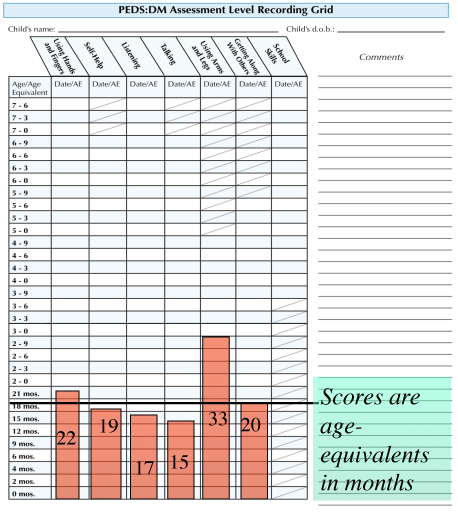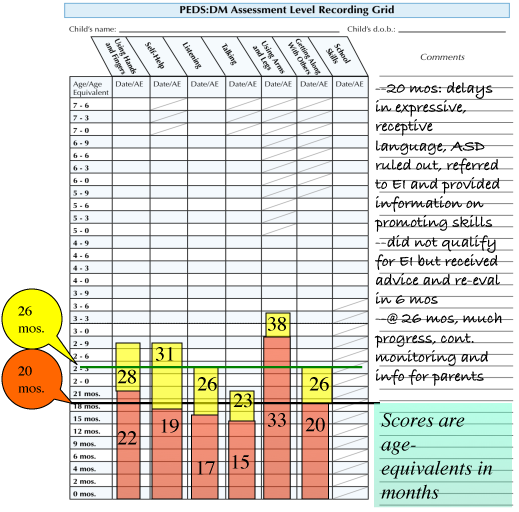The PEDS:DM-Assessment Level®, is especially useful for clinical/educational/outcome studies because it provides:
The ability of the PEDS:DM® Screening or PEDS:DM-Assessment Level® to be completed in large part by parent-report (e.g.,through mail-outs or in waiting rooms prior to an encounter) and without much professional assistance--given its 2nd grade reading level-- makes it an inexpensive way to measure outcomes in multiple domains.
Nevertheless, the PEDS:DM® can also be administered directly to children. Some grantors/reviewers for scholarly research/journal publication prefer researchers to compare information gathered by parent report (e.g., medical history, psychosocial risk factors, behavioral challenges) to direct measurement of children’s developmental outcomes.
*Note: The PEDS:DM® can be used in survey/telephone/interview studies, most especially when children are 3 ½ years and younger. At older ages, the PEDS:DM® requires parents (or professionals) to elicit skills from their children (e.g., names colors, letters, copy shapes, etc). So, if older children are included, we are happy to work with you on how best to measure older children (e.g., rewording items, mailing questions in advance so that families can try them with their children, etc.). Please contact us as needed.


PEDS is being revised as PEDS-Revised® (PEDS-R®) to improve the ability of all parents to raise concerns - not only in the domains PEDS currently probes: expressive/receptive language, gross/fine motor, behavior, self-help, school and social skills, but also in global/cognitive and other issues including psychosocial challenges and health problems. PEDS depended on parents to spontaneously share their worries without prompting. Parents with limited education and/or difficulty speaking English tended not to volunteer concerns about global/cognitive and other/health issues.
To address this challenge, PEDS-R® adds two questions that prompt for global/cognitive and health concerns. PEDS-R® is based on decades of research on Survey PEDS (Glascoe, 2013) plus 20 years of research on PEDS - an interview protocol used by the National Institutes of Health and the Centers for Disease Control and Prevention to determine disability prevalence and how well health care providers meet families’ needs (CDC, 2021).
Although Survey PEDS within the CDC/NIH Interviews renders risk frequencies (low, moderate, high) that are comparable to PEDS-R®, Survey PEDS involves only multiple-choice questions and does not elicit parents’ actual comments. This makes Survey PEDS less than useful for encounters in health care, education, psychology, social work, etc.
PEDS-R®, in contrast, elicits parents’ verbatim concerns that are crucial for quality care. For example, it is not enough to know that parents are worried about behavior. Clinicians need to know precisely what issue to address in order to tailor developmental-behavioral guidance and make targeted referral decisions when indicated (e.g., how to help with tantrums versus biting versus repetitive play or self-stimulation that is often apparent when children have autism spectrum disorders).
Current research using data from PEDS Online® as deployed in 63 clinics across 10 US States, compared PEDS to PEDS-R® on a sample of 1499 children averaging 29 months of age: N =302 were administered PEDS-R® and N = 1197 were administered PEDS. Parents were mostly Spanish-speaking and the two groups had comparable psychosocial risk levels (only 53% had completed high school; 27% met federal poverty criteria). The 302 families completing PEDS-R® were more likely to mention global/cognitive or other/health concerns (7% versus 2%). Both groups had elevated developmental-behavioral/mental health risk levels (26% versus 25%) as is expected when psychosocial risk is high. Nevertheless, professionals took concerns more seriously when parents completed PEDS-R®, i.e., clinicians were 3 ½ times more likely to also administer the PEDS:DM® and M-CHAT-R. Higher rates of cognitive and health concerns in the PEDS-R® group improved prediction of moderate to high-risk performance on other measures. [OR = 3.6, 95%CI (1.7 - 7.6)] (Chen et al, 2019).
PEDS-R® is available within PEDS Online® in Spanish and Chinese. PEDS-R® in English will be added in late summer 2021. Within PEDS Online®, PEDS-R® continues to provide information on types of concerns, Paths and thus indicators of risk, as well as recommendations about optimal next steps.
PEDS Online® also includes the option of administering PEDS-R® along with PEDS: Developmental Milestones (PEDS:DM®) and the M-CHAT-R. Most providers (up to 90% in some US States) use both PEDS Tools® along with an occasional M-CHAT-R, in compliance with AAP Policy. (Lipkin, Macias et al, 2020).
PEDS-R® has been translated into many other languages following a careful vetting process as prescribed by the International Test Commission (2021). For more information view our research on PEDS-R® in translation as used across the US and in other nations.
Digital copies of translations are provided freely to PEDS Online® users. To request translations please contact us.
Professionals can use our translations alongside PEDS Online®. There are several ways to work well with families who do not speak or read the languages on our site: English, Spanish or Chinese:
Changes to the PEDS-R® Response Form include two extra questions extending to the back side of the page, along with:
The PEDS-R® Response Form ensures that children’s records include clear evidence that PEDS-R® was administered and scored, results specified, and that plans (e.g., advice, types of referrals) are indicated.
See Identifying and Addressing Developmental and Behavioral Problems: A Practical Guide for Medical and Non-medical Professionals, Trainees, Researchers and Advocates. (Glascoe et al 2013) for comprehensive advice on helping families with next steps, delivering difficult news, finding development-behavioral promotion information in many languages, making effective referrals, training, national and international initiatives, etc.

PEDS Online® is being used effectively in such programs as 211LA where families in crisis call in for assistance (e.g., for help paying rent, utilities, issues with food insufficiency, homelessness, etc.). Most such families are at high risk for having children at risk for developmental-behavioral problems (even if their initial concern is more focused on the challenges of daily living). Interestingly, almost all families, despite their immediate crisis are willing to be asked questions about their children’s learning and progress, and willing to not only participate in screening but to follow-through with referrals.
Outcomes research on 211LA show the predictably high rates of problematic performance on PEDS Tools® and also high rates of very concerning performance on the M-CHAT-R--a measure of autism spectrum disorder. Please see our research pages for publications on use of PEDS Online® with at-risk populations.